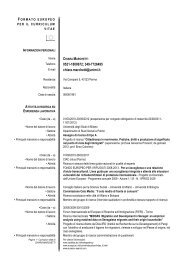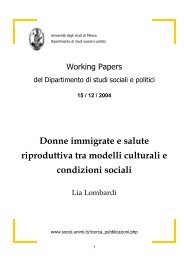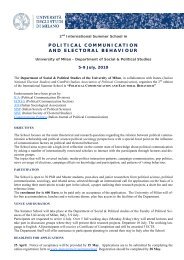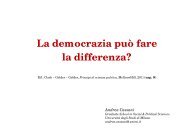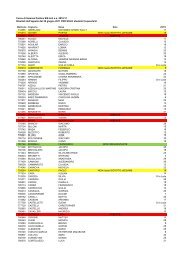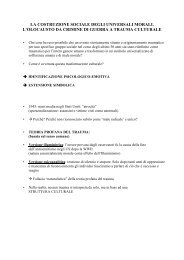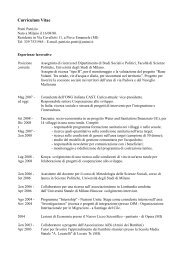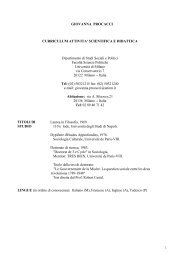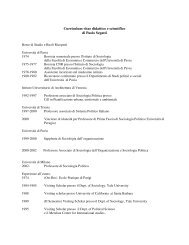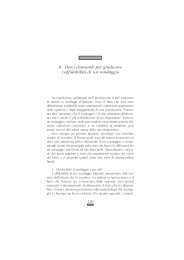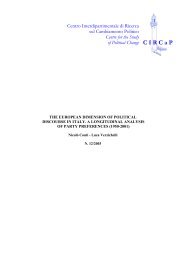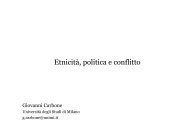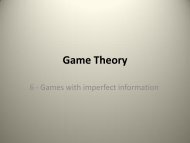dictatorship, democracy and development mancur olson
dictatorship, democracy and development mancur olson
dictatorship, democracy and development mancur olson
You also want an ePaper? Increase the reach of your titles
YUMPU automatically turns print PDFs into web optimized ePapers that Google loves.
Aless<strong>and</strong>ro Gabriele Ferraioli
“Monarchy is the best kind of government because the King<br />
is the owner of the country. Like the owner of a house, when<br />
the wiring is wrong, he fixes it”<br />
<br />
Could we deny that the owner of a country would have an<br />
incentive to make his property productive? What’s the<br />
difference with Democracy?<br />
We need:<br />
1. A new theory of Democracy <strong>and</strong> Dictatorship<br />
2. How these types of government affect economic<br />
developement
“No society can work satisfactorily if it does not have a<br />
peaceful order <strong>and</strong> usually other public goods as<br />
well”<br />
ANARCHY<br />
• Violence<br />
• Theft<br />
Victims lose<br />
goods <strong>and</strong><br />
the incentive<br />
to produce<br />
other goods<br />
NO<br />
PRODUCTION<br />
Colossal<br />
gains from<br />
providing<br />
Peace<br />
Can we conclude that because everyone could gain<br />
from it, a peaceful agreement emerge by voluntary<br />
agreement?
Problem: each individual bears the full costs of risks of anything<br />
done to help establish a peaceful order but receives only a share<br />
of the benefits.<br />
Small<br />
populations<br />
Large<br />
populations<br />
Voluntary<br />
agreement: each<br />
person obtain a<br />
great share<br />
Not voluntary<br />
agreement:<br />
costs>individual<br />
gain<br />
Primitive<br />
societies:<br />
collective action<br />
Why Large<br />
Populations<br />
avoided anarchy?
◦ Chinese warlords: roving b<strong>and</strong>its, without legitimation, settle down<br />
<strong>and</strong> take theft in the form of regulary taxation <strong>and</strong> at the same<br />
time maintain a monopoly on theft in the domain.<br />
◦ The b<strong>and</strong>it will take only a part of income in taxes <strong>and</strong> will provide<br />
public goods to generate an incentive to produce, save (capital<br />
after-taxes) <strong>and</strong> invest.<br />
◦ The monopolization of theft <strong>and</strong> the protection of the tax<br />
generating-subjects eliminates anarchy<br />
THE FIRST BLESSING OF THE INVISIBLE HAND:<br />
◦ The rational, self-interested leader of a b<strong>and</strong> of roving b<strong>and</strong>its is<br />
led, as though by an invisible h<strong>and</strong> to settle down wear a crown<br />
<strong>and</strong> replace anarchy with a government.<br />
◦ Thus government for large groups arises, not because of social<br />
contracts or voluntary transactions of any kind but because of<br />
rational self interest among those who can organize the greatest<br />
capacity for violence
Any individual who has autocratic control over a country will provide<br />
public goods because he has an “encompassing interest”<br />
Size of the stake in society: the larger is, the greater public goods<br />
provided<br />
• If an autocrat received 1/3 of any increase in the income of his domain<br />
in increased tax collections, he would then get 1/3 of the benefits of the<br />
public goods he provided<br />
• He would have an incentive to provide public goods up to the point<br />
where the national income rose by the reciprocal of 1/3 from his last<br />
unit of public good expenditure<br />
The encompassing interest of the autocrat permitted a considerable<br />
<strong>development</strong> of civilization<br />
From not long after settled agricolture until French revolution the<br />
humanity was subject to autocracy <strong>and</strong> tax theft, but under this<br />
stationary b<strong>and</strong>itry there was an impressive <strong>development</strong> of<br />
civilization.
So the autocrat has incentive to make his domain productive,<br />
because of the encompassing interest.<br />
But the autocrat is the owner of all wealth in a country: he has the<br />
incentive to mantain <strong>and</strong> increase the productivity, but he also<br />
charges MONOPOLY rent on EVERYTHING<br />
He has an incentive to extract the maximum possible surplus from<br />
the society <strong>and</strong> to use it for his purposes (the consumption of an<br />
autocrat is not limited)<br />
This PREDATION obscures the superiority of stationary b<strong>and</strong>it over<br />
anarchy <strong>and</strong> the advances of civilization that have resulted from it<br />
He will devote some of the resources he obtains through taxation to<br />
public goods but he will impose far higher tax rates than are needed<br />
to pay for the public goods since he use tax collections to maximize<br />
his net surplus<br />
Incentive to provide public goods + Incentive to extract max<br />
surplus
The autocrat gets all of his receipts in the form of explicit taxation<br />
The higher the level of provision of public goods, given the tax rate, the<br />
higher the society’s income <strong>and</strong> the yield from this tax rate<br />
T= , High P.G. I ↑ Y ↑<br />
The higher the tax rate, given the level of public-good provision, the lower<br />
the income of society<br />
P.G.= , High T I ↓ Y↓<br />
Assume level of P.G. is given<br />
• If we start with low taxation: as tax rates increase tax receipts<br />
increase; after the revenue-maximizing rate is reached, higher tax<br />
rates distort incentives <strong>and</strong> reduce income, so tax collections fall. The<br />
rational autocrat chooses the revenue-maximizing tax rate(Schumpeter<br />
1991, Ibn Kalduhn 1967)<br />
The optimal tax rate determines the share of any increase in income the<br />
autocrat receive (determines the level of the ecompassing interest)<br />
The autocrat spends money in P.G. up to the point where his last $ generates<br />
a $ increase in his share of the income.
2 c<strong>and</strong>idates for a presidency/ 2 parties seeking to form gov.<br />
Assumptions:<br />
◦ Democracy has no better motivation<br />
◦ Political leaders are self-interested, they use any expedient to<br />
obtain majority support<br />
C<strong>and</strong>idates are able to BUY majority transferring income from<br />
population to prospective majority<br />
Taxes imposed for this transfer reduce society’s output<br />
Would that generate distortion of incentives as autocracy? NO<br />
◦ Democratic Majority <strong>and</strong> Autocrat control tax collections<br />
(encompassing interest in society)<br />
◦ D.M. also earns a % of the market income of the society: his<br />
interest in society’s productivity is more encompassing<br />
◦ So D.M. will redistributes to herself less than A.
Suppose we are at the revenue maximazing rate<br />
Autocrat<br />
Increase of tax rate:<br />
↓of national<br />
income= ↑ total<br />
income taxated<br />
D.M.<br />
REDUCES tax rate to<br />
increase its income:<br />
↑ national income, ↑<br />
taxes collection, ↑<br />
market income<br />
Reduction of tax<br />
rate: ↑ of national<br />
income, ↓ total<br />
income taxated<br />
Optimal tax rate for<br />
D.M. is LOWER
DEMOCRACY’S INTEREST<br />
<br />
<br />
The more encompassing the interest, the less the social<br />
losses from redestributions to itself (D.M. has a bigger<br />
interest because: tax income+market income)<br />
The narrower the interest, the less it will take account of<br />
social costs of redestributions<br />
<br />
Thus, also in <strong>democracy</strong>, sometimes, the predictions are too<br />
optimistic: small parties/ lobbies have little incentives to<br />
consider social losses<br />
<br />
<br />
Democracy will not necessarily destribute to itself less than<br />
Autocracy. However redistributions will be shared by citizens<br />
Democratic political competition, even when it works badly,<br />
doesn’t give to the parties’ leaders incentives to extract max.<br />
surplus from society as in the autocracy.
Maximum income in<br />
economy if high<br />
rate of investments<br />
<strong>and</strong> long-term<br />
investments<br />
Autocrat must<br />
secure:<br />
•protection from<br />
theft <strong>and</strong><br />
expropriation<br />
•Impartial<br />
enforcement of<br />
contracts<br />
•Stable currency<br />
Short-viewed Autocrat:<br />
•Expropriates assets<br />
•No enforcement<br />
•Repudiates debts<br />
•Prints money to spend<br />
Long King’s life <strong>and</strong><br />
succession of dynasty<br />
socially desirable to avoid<br />
short time problems<br />
The Autocrat must<br />
promise, but his promise<br />
it’s not enforceable by<br />
another independent<br />
source of power
Conditions for economic <strong>development</strong><br />
In an economy individuals need protection of properties<br />
<strong>and</strong> contracts<br />
So individuals need a secure government that protect<br />
individual rights<br />
Individual rights are artifact of a special set of<br />
governmental institutions: there’s no property without<br />
government<br />
Rights protected from private violation but also from the<br />
government itself<br />
Conditions needed for economic <strong>development</strong> are the<br />
same needed for a Lasting Democracy
DEMOCRACY<br />
Property &<br />
contracts<br />
last<br />
across<br />
generatio<br />
ns<br />
Short<br />
horizons<br />
for<br />
political<br />
leaders<br />
but<br />
succession<br />
of power<br />
under the<br />
rule of law<br />
Long term<br />
contracts,<br />
trusts <strong>and</strong><br />
foundatio<br />
ns<br />
Capital<br />
flees from<br />
countries<br />
with<br />
dictatorsh<br />
ips to<br />
stable<br />
democraci<br />
es<br />
Highest<br />
level of<br />
economic<br />
developm<br />
ent <strong>and</strong><br />
economic<br />
developm<br />
ent<br />
(Winnings<br />
in wars)
External<br />
transitions<br />
Internal<br />
transitions<br />
Subjects don’t overthrow the<br />
autocrat: same problem of lack of<br />
social contracts in large societies<br />
(Pharaohs, Saddam…). Replaced<br />
by another stationary b<strong>and</strong>it.<br />
Absence of conditions<br />
for autocracy:<br />
dispersion of forces, no<br />
one can overpower the<br />
others<br />
Democracies are rich <strong>and</strong><br />
have prevailed against<br />
autocracy models (fascism<br />
<strong>and</strong> communism)<br />
Whigh<br />
interpretation of<br />
history<br />
Dahl (1971),<br />
Vanhnen (1989)
Balance of power that keeps any leader from<br />
assuming total control in an area<br />
Each leader can’t be the autocrat of a small domain: in<br />
large areas there could be small-scale autocracies<br />
Best option is power sharing: engage in fighting or<br />
work out a truce (peace <strong>and</strong> public goods<br />
advantageous for all)<br />
Peaceful conditions making mutually advantageous<br />
contracts<br />
Estabilish independent judiciary (contracts <strong>and</strong><br />
properties protected)<br />
Elections<br />
INITIAL EMERGENCE OF DEMOCRACY WITH<br />
GLORIOUS REVOLUTION IN ENGLAND (1689) <strong>and</strong><br />
13 COLONIES IN U.S.
Autocracy<br />
Encompassing<br />
interest of the<br />
autocrat: order,<br />
public goods<br />
<strong>and</strong> social<br />
progress<br />
Democracies<br />
Emphasis on<br />
individual rights for<br />
<strong>democracy</strong> is the<br />
same for property<br />
<strong>and</strong> contracts<br />
Advantages from<br />
encompassing<br />
parties<br />
Difficulties<br />
generated by<br />
interests on<br />
economic<br />
policymaking<br />
Individual rights<br />
are not secure<br />
in the long-run<br />
Preventing<br />
extraction of social<br />
surplus by leaders



